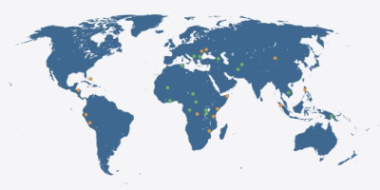Transparency and Accountability

Public trust and confidence in justice sector institutions is key to investment and commercial transactions, and necessary for sustainable development and social change. IDLO is engaged in programming that enhances the integrity and capacity of such institutions to promote good governance by holding State and other constituencies, including the private sector, accountable, ultimately leading to people’s confidence in the laws and institutions that are meant to serve them.
IDLO Gender Strategy: Access to justice for women and girls
Kyrgyz judiciary’s IT branch tests new court software
New software for automated distribution of civil, economic and administrative cases is being tested by the Supreme Court of the Kyrgyz Republic, aimed at simplifying case assignment among judges, reducing corruption and facilitating fairer, more efficient case handling.
IDLO Director-General to visit Ukraine: Media Advisory
Kyiv, October 24, 2017 - The Director-General of the International Development Law Organization (IDLO), Irene Khan, will visit Ukraine from October 25 to 27, 2017 to meet representatives of the Government of Ukraine and other key stakeholders in the rule of law sector to discuss IDLO’s work and explore areas of potential future collaboration.
Integrity and anti-corruption in the Philippines
With rapidly growing economic and social sectors, the improvement of its justice system is key to the Philippines securing the status of a newly developed country. IDLO has been implementing a program in the Philippines to enhance the competency of prosecutors with a view to increasing the successful disposition of cases against public officials and efficiently addressing corruption.

Ukraine: Public services one-stop-shop opens in Kharkiv
The most advanced yet Public Service Center has opened in Ukraine’s second-largest city Kharkiv, currently providing over 400 administrative and social services through the one-stop-shop concept that has previously proven successful in Odessa and Mariupol.

E-evidence in Indonesia: A new frontier in anti-corruption
Electronic evidence is progressively becoming a key component in corruption cases in Indonesia. Gradually, e-mails, recordings, text messages and social media posts are presented as evidence that can make or break a case.

Kenya court decision demonstrates respect for rule of law
September 1, 2017 – Today’s decision by the Kenya Supreme Court demonstrates that the Kenyan Judiciary can effectively and efficiently handle electoral disputes in line with the Constitution, said the International Development Law Organization (IDLO).
“The ruling is a clear demonstration of why supporting the independence of the Judiciary and investing in building judicial capacity, including to resolve electoral disputes, builds the democratic process.”
Anti-corruption through Ukraine Service Centers
For decades, the public sector in Ukraine had been considered deeply corrupt and oftentimes, dysfunctional. Nepotism was an accepted source of both employment and promotion. Applying for and receiving administrative services was usually an exhausting and intimidating experience that could only be avoided through paying bribes.
In response, IDLO has continued to support decentralization and anti-corruption in Ukraine through the establishment of new Public Service Centers (PSCs).
IDLO Director-General to visit Kenya to discuss electoral justice and gender equality
Media Advisory: Interview Availability. Nairobi, April 27, 2017 - The Director-General of the International Development Law Organization (IDLO) will visit Kenya from May 3 to 5, 2017 to discuss electoral justice, gender equality and the rule of law with representatives of the Government of the Republic of Kenya, the judiciary, the legislative, diplomatic community, civil society and the women’s movement.
Pages
Key Initiatives
-
 As part of IDLO’s continuous commitment to accountability and results-based management, IDLO is pleased to share this Evaluation Brief (summarised evaluation report): “Evaluation of the project "Supporting Justice Sector and Anti-Corruption Reforms in Ukraine - Phase 1”. The evaluation has been conducted by independent evaluation experts, supervised by IDLO’s Evaluation Unit.
As part of IDLO’s continuous commitment to accountability and results-based management, IDLO is pleased to share this Evaluation Brief (summarised evaluation report): “Evaluation of the project "Supporting Justice Sector and Anti-Corruption Reforms in Ukraine - Phase 1”. The evaluation has been conducted by independent evaluation experts, supervised by IDLO’s Evaluation Unit. -
 Despite the positive momentum from Ukraine’s justice sector reforms, there has been a lack of court judgments in top corruption cases, underscoring the need for greater institutional efficiency, transparency and independence in the process of prosecution. As corruption cases often involve complex financial schemes with elements of money-laundering, there is a strong need to delegate them to a specialized court. In response to these needs, the High Anti-Corruption Court was formally established on April 11th, 2019.
Despite the positive momentum from Ukraine’s justice sector reforms, there has been a lack of court judgments in top corruption cases, underscoring the need for greater institutional efficiency, transparency and independence in the process of prosecution. As corruption cases often involve complex financial schemes with elements of money-laundering, there is a strong need to delegate them to a specialized court. In response to these needs, the High Anti-Corruption Court was formally established on April 11th, 2019. -
Growing insecurity and instability, recurring and protracted conflict and violence, increasing inequality, exclusion and discrimination, deterioration of international human rights and humanitarian norms, all signal the importance of strengthening the rule of law in today’s rapidly changing world. Notably, Goal 16 of the 2030 Agenda for Sustainable Development seeks to promote peace, justice and strong institutions.
-
 The Kyrgyz Republic has made significant strides in working toward improvements to a justice system shaken to the core following the 2010 Revolution. While a wholesale reselection process of judges changed the landscape and provided hope for real change, it also created a judiciary staffed with many inexperienced, under-skilled first-time judges who are more easily exposed to negative influences - both perceived and real. Consequently, the public mistrusts the judiciary and holds a negative perception of it being corrupt, inefficient and dependent on other branches of government.
The Kyrgyz Republic has made significant strides in working toward improvements to a justice system shaken to the core following the 2010 Revolution. While a wholesale reselection process of judges changed the landscape and provided hope for real change, it also created a judiciary staffed with many inexperienced, under-skilled first-time judges who are more easily exposed to negative influences - both perceived and real. Consequently, the public mistrusts the judiciary and holds a negative perception of it being corrupt, inefficient and dependent on other branches of government. -
 The Brief (or Lessons Learned Brief), titled Avoiding Violence and Enhancing Legitimacy: Judicial Preparedness for Handling Electoral Disputes in Kenya and Beyond, explores IDLO’s support to the Kenyan judiciary to resolve electoral disputes. The 2007 electoral violence in Kenya demonstrated that disastrous consequences can follow when the electoral dispute resolution system is not trusted to deal fairly and efficiently with contested elections.
The Brief (or Lessons Learned Brief), titled Avoiding Violence and Enhancing Legitimacy: Judicial Preparedness for Handling Electoral Disputes in Kenya and Beyond, explores IDLO’s support to the Kenyan judiciary to resolve electoral disputes. The 2007 electoral violence in Kenya demonstrated that disastrous consequences can follow when the electoral dispute resolution system is not trusted to deal fairly and efficiently with contested elections.
Latest Activity
|
Publication
|




